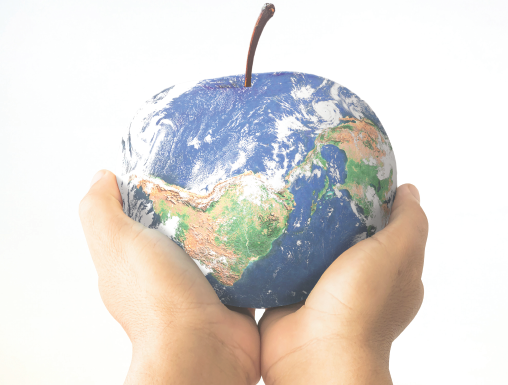
Feed the world
Animal protein is a vital part of a healthy and balanced human diet. It is also central to the livelihoods of millions of people around the world, especially in areas already struggling with food insecurity and lack of resources. Dairy cows alone support the livelihoods and food security of one billion people around the world.
However, we also know that animal agriculture in its current form is taking a huge toll on our planet and ecosystems. Animal farming accounts for 14.5 percent of all human-derived greenhouse gas emissions. We currently use 1.4 billion of the world’s 13 billion hectares of total land to produce both animals and their food, and we would need a further billion hectares to feed the estimated 9.7 billion people that will live on earth by 2050. If animal farming continued as usual while other industries decarbonise to meet the 1.5 degree warming limit laid out in the Paris Agreement, it would consume an enormous 81 percent of humanity’s total emissions budget. This is without even factoring in the 70 percent expansion in demand experts predict for animal protein – far outstripping the 40 percent growth in the human population.
These statistics may seem distressing, but there are several ways we can improve the sustainability of animal agriculture to enable us to feed our entire population a healthy, balanced diet. It was with this in mind that we at DSM Animal Nutrition and Health launched our We Make It Possible initiative, which aims to educate those at all stages of the value chain about what our industry can do to ensure we remain within the limits of our planetary boundaries, becoming more efficient whilst reducing emissions to improve our environmental footprint.
Challenges with sustainable animal agriculture are all interlinked. For example, food loss and waste are responsible for eight percent of global emissions, a footprint equivalent to a nation behind only the US and China on the global scale. Much of this loss is due to animal ill-health and poor meat quality, issues which in turn are leading to the overuse of antibiotics in animal agriculture, driving antimicrobial resistance (AMR). AMR currently causes 700,000 deaths a year; by 2050, this could rise to as many as ten million, making it the single leading cause of death. Rising temperatures from emissions could exacerbate this issue further as both people and animals are forced to live in a smaller area, whilst destruction of natural habitats for arable land will mean our ecosystem is less able to absorb emissions.
Evidently, we need a multifaceted approach to sustainability that takes in all these issues and aims to take the pressure off our environment. Animal feed is a vital place to start. Of the human-derived emissions that relate to animal protein production, 27 percent are currently due to feed, whilst enteric fermentation and manure management account for the vast majority of the rest. By enabling the use of different feed raw materials – for instance, those that are locally sourced or have a lower carbon footprint – we can significantly lower the footprint of animal agriculture.
Similarly, by increasing feed efficiency and improving nutrient utilization, we can produce more protein from less feed without compromising animal health, whilst minimizing the amounts of harmful emissions that enter the environment through manure (for example, nitrogen and phosphorus). There are also ways we can edit feed to alter the process of enteric fermentation so that as much as 30-40 percent less methane is emitted, again representing a huge reduction in net emissions. These gains can be achieved through careful scientific changes to the makeup of feed, using feed enzymes and what we know about nutritional science.
For example, vitamin D is good for the immune system, bone strength and eggshell strength. By matching the vitamin D contained in food to the animal’s needs and by using more bio-available forms of vitamin D, we can help animals to fight off disease themselves, without using antibiotics. This also reduces food loss and waste in the form of animal deaths and spoilt products (for instance, much milk becomes undrinkable due to clinical mastitis in cows). It also helps to reduce the food we lose in transport and in the hands of consumers, for instance by strengthening eggshells and reducing the amount of breakage.
It isn’t enough for one company, government or country to behave sustainably. We need everyone across the value chain and in all industries to move quickly towards models that do not damage our environment or future generations.
We Make It Possible is intended as a call to action for those working in food to think about how their business can begin to prevent unsustainable practices along the food chain. To healthily feed our entire population is a moral imperative, and it is not beyond the reach of humanity’s considerable scientific expertise, if everybody works together.
If not us, who? If not now, when?
DSM Animal Nutrition and Health
Fidelis Fru is Vice President/Business Director – Europe, Middle East and Africa at DSM Animal Nutrition and Health. Royal DSM is a global, purpose-led, science-based company active in Nutrition, Health and Sustainable Living. DSM’s purpose is to create brighter lives for all. DSM addresses with its products and solutions some of the world’s biggest challenges while simultaneously creating economic, environmental and societal value for all its stakeholders – customers, employees, shareholders, and society at large. DSM delivers innovative solutions for human nutrition, animal nutrition, personal care and aroma, medical devices, green products and applications, and new mobility and connectivity.
For further information, please visit: www.dsm.com/anh/en_US/home.html